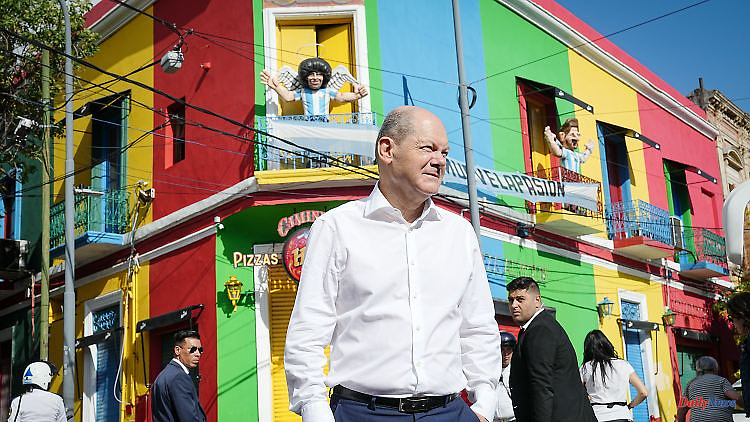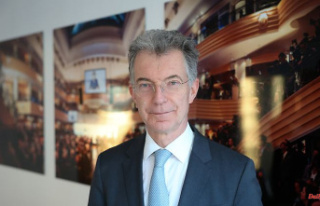Chancellor Scholz has a promise in South America: Germany wants to be a partner in a future for everyone. During a round of talks, Argentines confront him with critical questions. But the Chancellor explains - and remains positive.
How does it fit together that Germany is pushing for renewable energies, but has now put its coal-fired power plants back into operation and Greta Thunberg has been arrested? It's just after 9 a.m. and the morning sun is peeping through the leafy canopy of the patio in the working-class neighborhood of La Boca. Chancellor Olaf Scholz hasn't been there long, a few minutes earlier he walked through the colorful houses near the harbor wall and had his picture taken in front of Diego Maradona - with a halo and little wings - greeting from a balcony.
About 50 young Argentines came to this town hall format in Buenos Aires. They ask questions about the future, climate change and how Germany wants and can help their country. Argentina is the first stop on the Chancellor's trip to South America, and he is also received in Chile and Brazil. A lot is about energy security and further economic relations, such as the free trade agreement between the EU and Mercosur. The economic area that Argentina and Brazil belong to together with Paraguay and Uruguay. It's about the future of Germany.
The Chancellor's multi-day trip is intended to mark Germany and other EU countries in South America again on the globe: There is business to be done here, there are potential partners and willing investors here. The plans of the traffic light coalition and above all the Ukraine war have shaken the supply of fossil energy. The countries of South America therefore see what may be a historic opportunity to achieve more prosperity through the new energy sources.
Then Scholz explains. Quiet, simple, causal. Russia has stopped supplying the transitional energy source gas, and there is no longer any oil from there either. So the existing old power plants were restarted, but limited until 2024. As the fourth largest economy in the world, Germany has an industry with enormous energy consumption of 600 terawatt hours, which will triple because everyone will switch to electricity, including heavy industry, such as steelworks. But you have to build routes, because the complete switch to renewable energies takes time, but you have committed yourself to the transition, there are already new LNG terminals in the North Sea; and and and.
This goes on for almost an hour. The Chancellor is thriving. When asked about unions, he talks about his professional past before he went into politics. When it comes to migration, he talks about Hamburg and the German emigrants who came to Montevideo and Buenos Aires on steamers. He is trying to refute concerns about the consequences of closer economic cooperation with the Supply Chain Act. This also guarantees clean production elsewhere, because German companies are not allowed to buy anything else in Latin America. "I am in favor of doing everything" to achieve the conclusion of the EU-Mercosur agreement. He discovered "new vigour" in the region. "And the world will be a better one," he says at some point. You want to believe him.
Argentina and Chile, together with Bolivia, belong to the lithium triangle, where the largest deposits of the coveted raw material for the switch to electric mobility are stored. From 2035, cars with combustion engines will no longer be allowed to be newly registered in the EU. If no other technology is developed, the need for batteries will continue to grow. South America would also be an excellent location for the production of renewable energy and green hydrogen: there is a lot of sun, a lot of wind, and long coasts. Shortly before the end, Scholz can no longer stay in his seat, he strolls a little towards the questioners with his microphone.
The day before, things were much more formal when Scholz was received with military honors by Argentina's Foreign Minister Santiago Cafiero and President Alberto Fernández. He moved more slowly then, didn't say much else, but was less approachable. An official environment. The Scholzomat runs along more clearly. Even if, dear comrade, he addresses Fernández as you.
The two heads of state say that the EU-Mercosur agreement with the removal of trade barriers should come into force quickly. Fernández's confession has never been heard so clearly. So far, the fear of his socially oriented Peronist alliance has been too great that domestic industry would only have disadvantages, that European goods could force them off the market and into ruin.
The signed text of the contract was negotiated by Fernández's free-market predecessor, Mauricio Macri. Additional agreements should save the agreement. Scholz was apparently able to credibly assure Fernández that Germany came in good faith and that a compromise is not impossible. The Peronists also desperately need positive results. Presidential elections are held in October. Inflation is high, poverty rates are entrenched, and the coalition is losing out to young voters.
Scholz reassured: Both sides should benefit from cooperation, which is why the points of criticism will be addressed together and the agreement will be concluded quickly. It would be a counterweight to the Chinese, who are also very active on the continent. It can be heard from those close to the federal government that Scholz's broad initiative for greater cooperation is seen as something like the last chance for Germany. Otherwise you were just too late.
In addition to Scholz' assurances, Lula da Silva's assumption of office in Brazil should also be a reason for the new openness to the agreement, which has been negotiated for more than 20 years. The new Brazilian president wants the agreement badly. Brazil is Argentina's largest trading partner. At the same time, Lula wants to enforce much stronger protection of the Amazon rainforest anyway, which France, for example, has made a condition for ratifying the agreement. But in the EU Austria and Ireland have also blocked themselves so far for fear of cheap agricultural imports that could damage their agriculture.
After the question and answer session, the chancellor, along with the business delegation and journalists, climbs into the waiting column of vehicles that drive to the Parque de la Memoria, the Park of Remembrance, where the 30,000 victims of Argentina's last military dictatorship are commemorated. Scholz listens to the explanations, he puts a flower in the sign with the name of the German Elisabeth Käsemann, he talks to relatives, throws a lily into the sea, and before continuing again he even takes a moment alone; puts his hand on a hundred-meter-long wall with the names of the dead and looks away from the baggage train to the water.
The convoy sets off again, races to visit the Volkswagen factory in the province of Buenos Aires, which has postponed its entire work shift to Sunday for the tour of the high-ranking visit. It is one of the most modern plants in South America, cars for export to Australia and Africa also roll off the assembly line here. Just a few years ago, the carmaker invested $600 million in the plant. There's still time to get to know union representatives, then it's off again - back to the airport, onto the chancellor's plane to Santiago de Chile, then to Brazil. And on Wednesday for day-to-day business in Berlin.












